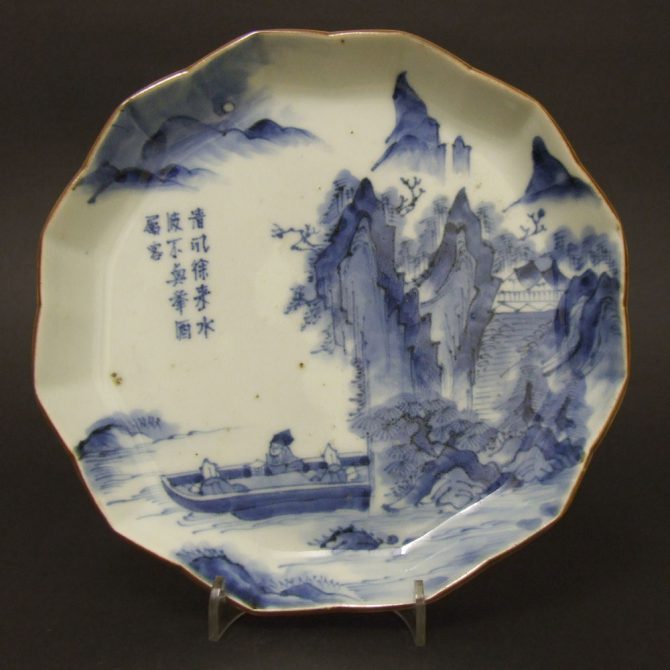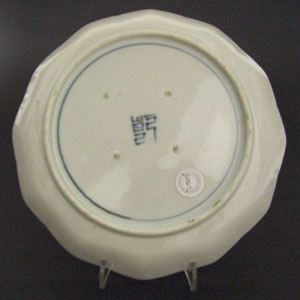
ARITA c.1770 – 1790 Japanese Porcelain
An 18th Century Japanese Blue and White Shaped Dish, Arita Kilns c.1770-1790. Decorated with a Design Inspired by `Ode to the Red Cliff` by Su Shi (1037 -1101). The Rim with a Fuchibeni Iron-Oxide Dressing.
SOLD
- Condition
- Perfect but with a few iron-spots in the glaze.
- Size
- Diameter : 20.4 cm (8 inches).
- Provenance
- From the collection of Japanese porcelain belonging to Spence family, removed from Japan in c.1941. These pieces of Japanese blue and white Arita porcelain were inherited from her mother by Miss Joan Spence who was born in Kobe, Japan. This type of Arita blue and white porcelain was made for the Japanese market and was not exported, consequently it is not commonly found in the West. Shortly before Japan`s attack on Pearl Harbour on the 7th of December 1942, all foreigners were obliged to leave the country with immediate effect, taking only one packing case with them. With the help of their Korean driver and her father`s contact, Joan and her mother managed to escape with eight cases on board a ship to Vancouver. Apart from some pieces that were given away, this collection of blue and white Japanese porcelain has been largely kept in tact since it left Japan in c.1941.
- Stock number
- 22969
- References
- For a blue and white dish of a similar form with this design see : The Preliminary Event for the World Ceramic Exhibition, Shibata Collection Part 4, The Establishment and Transformation of the Ko-Imari Style (Akihiko Shibata and Yuko Shibata and others, The Kyushu Ceramic Museum, 1995) page 156, plate 301.
Information
Ode to the Red Cliff :
`Ode to the Red Cliff` was written by Su Shi (1037 -1101) in 1082. It is a mournful atmospheric poem of a moon lit boating party where sad music was played on a bamboo flute, songs were song, wine was drunk while "We let our small boat drift freely like a reed and rode along the expanse of the unknown". Thoughts change to the famous battle `Battle of Red Cliffs`, life and war are meditated upon "Riding a small boat, We raise gourd cups to toast each other. We are like a speck of grain in the sea Or mayflies between heaven and earth". The `Battle of Red Cliffs` was part of the wars of the Three Kingdoms. The Battle of Red Cliffs, otherwise known as the Battle of Chibi, was a decisive battle at the end of the Han Dynasty, immediately prior to the Three Kingdoms period. It was fought in the winter of 208/9 A.D. between the allied forces of the southern warlords Liu Bei and Sun Quan and the numerically superior forces of the northern warlord Cao Cao. Su Shi (also known as Su Dongpo) was one of the leading figures of the Song dynasty. Renowned for his poetry, essays, painting, and calligraphy, Su Shi was a highly controversial persona within the political arena. After passing the civil service exams, he entered the literati circle and embarked on a career in the bureaucracy. Su Shi opposed Wang Anshi and his policies, and was banished twice for his opposition. During his exiles, Su Shi composed some of his most famous works, many of which were informed by Confucian, Buddhist, and Daoist philosophies. Su Shi employed political satire and wit, but also had a somewhat romantic view of nature. Su Shi espoused the view that one should live life to the fullest, and much of his writing and art was emotional. After he died during his (second) return from exile, his work was temporarily banned; later writers and critics would recognized Su Shi as one of the preeminent writers in Chinese history.
